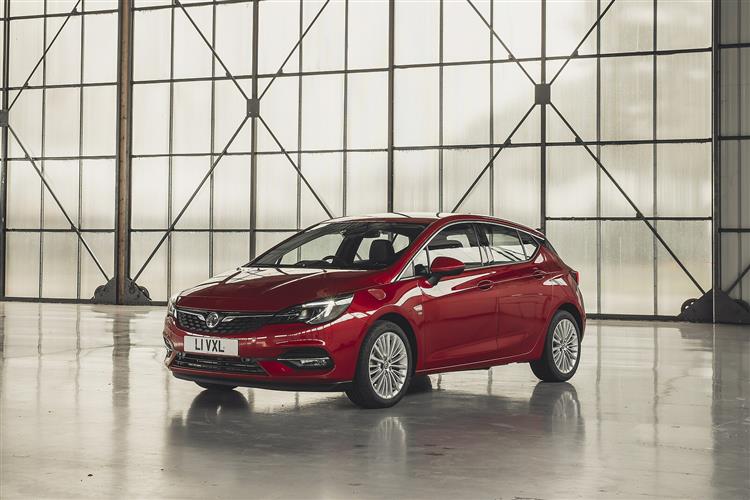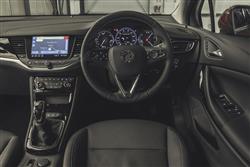How will you view?
This is a sample, showing 30 seconds of each section.
ASTRA-NOMICAL VALUE (some text hidden) SECTIONED_new_vauxhallastra_2019
By Jonathan Crouch
Introductionword count: 81
There wasn't much wrong with Vauxhall's seventh generation 'K'-series Astra that a few good engines wouldn't have sorted out. These were added as part of the updates made in 2019, delivering efficiency gains that might cause careful family hatchback buyers to see this car in a whole new light. The hatch and Sports Tourer variants on offer both got extra technology too as part of the 2019 changes. Think you know the MK7 Astra? Maybe it's time to take another look.
Modelsword count: 24
Models Covered: (5-door hatch/Sport Tourer estate) 1.2, 1.4 petrol / 1.5 CDTi diesel [SE, Business Edition Nav, Griffin, SRi Nav, SRi VX Line, Elite])
Historyword count: 393
According to Vauxhall, over a quarter of all British drivers have at some point either owned or driven an example of their Astra family hatch in the forty years this model line has been on sale. A pretty significant car for our market then - which was why in 2019 the mid-life changes made to the seventh generation 'K'-series Astra (which had first been launched in 2015) were so substantial. By 2019, this model was having to face down completely new versions of its two biggest family hatch rivals, the Ford Focus and the Volkswagen Golf. By this point, the appeal of this car amongst private buyers had rather waned; Astra sales were still strong, but that was mainly because 80% of production went to fleets. It was quite rare by 2019 to find an individual prepared to ignore the appeal of glitzier rivals or trendy SUVs and put down money for one. Vauxhall though, was out to convince private customers that they should, and to that end gave this car a completely fresh line-up of all-aluminium three cylinder petrol and diesel powerplants, mated to a revitalised range of transmissions. In 2019, we expected that the engines would be borrowed from Peugeots and Citroens, as had been the case with most new Vauxhalls launched up to that point following the PSA Group's takeover of the brand in 2017. In the event, these powerplants dated from the General Motors era. Despite that, they offered class-leading running cost figures that were significantly better than before, with updated Euro-emissions compliance that brought key tax savings, particularly to business buyers. Other changes to this seventh generation 'K'-series model were less significant. There was still the same choice of either five-door hatch or Sports Tourer estate models, but both body styles got a few equipment updates and some minor styling tweaks. To be fair, relatively few changes in other areas were really needed. We always recommended this design highly as an all-round driver's car and - if priced rightly - as a complete family hatchback package. Plus, it was still made in this country - by 2019, the only Vauxhall apart from the Vivaro van that was. Overall, this was certainly an under-rated car, which sold until the launch of the eighth generation model in late 2021. But is it one you should consider buying? Let's find out.
What You Getword count: 510
Mid-term facelifts are usually all style over substance. With the 2019 changes to this MK7 Astra though, it was the other way round. As before, there was a choice of two body styles, a five-door hatch or an alternative 'Sports Tourer' estate. You'd need to be a sales person or a fanatically loyal Astra owner to notice the visual changes made, which are only really evident at the front. The twin chrome lines that previously flanked the central brand badge on the grille were replaced by a single silver strip. That flows into the daytime running light elements in headlamps that with this post-'19 design feature full-LED illumination in most models. At the wheel, as with original MK7 Astras, the characteristic fascia element is what Vauxhall referred to as a 'blade'-style panel that stretches right across a cabin that remains ergonomic, quite nicely finished and, on plusher variants, relatively smart, though there's perhaps not quite the depth of quality you'd feel in a rival Volkswagen Group product. Infotainment's taken care of by a centre-dash screen of either 7 or 8-inches in size. Go for a car fitted with the 'Multimedia Navi Pro' package that gets you a bigger centre monitor and you also get a further 8-inch screen to replace the two conventional analogue dials you'd otherwise view through the three-spoke steering wheel. This instrument monitor can't show full mapping but it's highly configurable with all kinds of useful data. Finding a comfortable driving position is straightforward and on base models, we'd recommend finding a car whose original owner paid the small amount extra that Vauxhall asked for the superbly supportive 16-way-adjustable 'Driver's ergonomic active seat', certified by the German 'AGR' organisation who campaign for seat design better suited to healthier backs. What else? Well your over-the-shoulder visibility is a little compromised, but there's plenty of cabin storage space. In the back, once inside, it's actually a lot more spacious than the exterior dimensions and the outward styling lead you to expect. With the original version of this MK7 Astra, the designers pulled off the magic trick of reducing the wheelbase by 20mm at the same time as improving rear leg room by 35mm. We're still surprised by that; there's almost as much space for your knees as you'd find in a Skoda Octavia, the family hatch class leader in this regard. Scalloped front seat backs help here, as does the way that you can slide your feet properly right under the seat in front. Finally, let's consider luggage space, another area you'd think might have been compromised by this seventh generation model's slight reduction in size in post-2019 form. Actually when you raise the tailgate in the hatch version, there's a very usable 370-litre space (measured up to the parcel shelf). True, that isn't an especially noteworthy figure by period class standards, but it's not a bad showing for a car less than 4.4-metres in length. Earlier, we mentioned the Sports Tourer version's longer wheelbase; well as you'd expect, this facilitates a much greater level of capacity - 540-litres.
To see the full road test text contact us on 0330 0020 227
Pictures (high res disabled)

.jpg)
|
.jpg)
|
.jpg)
| |||
.jpg)
|
.jpg)
|
.jpg)
| |||
.jpg)
|

|
Scoring (subset of scores)
Category: Compact Family Cars
| Performance | |
| Handling | |
| Comfort | |
| Space | |
| Styling, Build, Value, Equipment, Depreciation, Handling, Insurance and Total scores are available with our full data feed. | |



